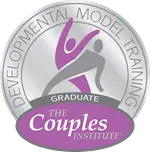FAQ

Common Questions
Availability

Yes. This will be updated as soon as that changes. The easiest way to schedule is to book online (so you can see the calendar of what is available). When you schedule, you’ll be sent a link to intake forms to be filled out electronically. Because it helps to have these forms completed no more than 24 hours before an appointment, you will be contacted to reschedule or cancel if the forms are not completed at least 24 hours in advance. There is also a 24-hour cancellation policy, and clients are charged the full fee if they need to cancel and do not do so within this timeframe. However, for those who have questions or prefer to schedule by phone, you can call 614.327.1600. Read more about Aaron Engel, the owner.
It depends on the extent of the issues and the couple’s willingness to work independently. It may take a couple of months, or it may take six months to a year. The average is 8-20 sessions. Sometimes it is somewhat of a revolving door, or clients gradually space out how often they are seen but continue with periodic long-term maintenance.
Finding the time can be a challenge. While Telehealth has its disadvantages for couples therapy, it is an option if finding a babysitter isn’t practical or saves time. When couples prioritize wanting a happy relationship, they can typically find the time.
See pictures of the office environment.
Yes, in-person appointments are available in Columbus (Dublin), Ohio. Telehealth is also available to anyone in Ohio.
Cardinal Point Counseling is located near Dublin, Upper Arlington, Hilliard, New Albany, Deleware, Westerville, Marysville, Worthington, and Columbus, Ohio. The practice can be accessed via I-270. Telehealth appointments are available for anyone wanting therapy in Ohio. Cardinal Point Counseling is a great place to find couples counseling in Columbus, Ohio, and a marriage therapist.
Counseling Process
Spark the flame: We kick things off by revisiting the sparks that ignited your relationship – that first meeting, those butterflies, the early magic. Then, we embark on an oral history journey, tracing your story together to understand how you got here.
Dive deep: After our first session, we suggest taking the Gottman assessment, a roadmap to your relationship’s strengths and stumbles. This handy tool pinpoints specific “Gottman interventions” – exercises you can try, tailor-made for your unique dynamic.
Solo sessions: Individual sessions with your therapist typically follow the Gottman assessment. It’s natural that things might surface during these sessions that wouldn’t in a joint session. While confidentiality reigns, we’re big on transparency. So, while your therapist won’t say, “Your partner thinks you’re a snoring monster,” they might ask, “How’s your sleep situation impacting your connection?”
Personalized path: We weave the Gottman method with other approaches like EFT (Emotionally Focused Therapy) to craft a personalized therapy experience just for you. Think of it as a delicious relationship cocktail, expertly mixed to suit your unique flavor profile.
If you choose us, you and your partner will have the opportunity to fill out brief information about your relationship online. An initial history interview will help you review how your relationship started and how it has changed over time. This information can be used to collaboratively create goals and interventions in marriage counseling to help improve your relationship.
Most people describe the experience as mainly pleasant and positive. But sometimes healing requires some temporary distress. Counseling is conducted in a supportive fashion, where we try not to take sides or, if taking a side, to take the side of your relationship goals.
Absolutely. Many of the techniques and common issues are the same for every couple. Differences can be addressed if applicable.
We can incorporate religious principles into marriage counseling and discuss religion if you choose. Members of all faiths are welcome to integrate their religion into couples therapy. However, most clients prefer not to discuss religion, which is also acceptable. There may be cases where using clergy makes sense in conjunction with working with a licensed counselor. For example, those who are receiving pre-marriage counseling at a religious organization may want to supplement this counseling by also using a counselor for a few sessions. We also offer Christian pre-marriage counseling.
Sometimes, marriage counseling brings clarity and knowledge about the best decision for you.
You don’t have to be married or living together to want a healthier relationship. Relationship counseling is available for those in all relationship stages, including engagement.
The philosophy is that you are intelligent adults who can make your own decisions. You will be asked the extent to which you want assignments to complete independently. Those that do more work on their own usually have better outcomes. At the same time, some clients prefer to do the assignments in sessions. That is fine too, know that it will cost you more and take more sessions. Clients who want to be held accountable will be held responsible for outside work (but let’s face it, only so much can be done in this regard). Clients who want to be left alone can be left more alone outside work accountability. Homework doesn’t have grades, and the only person that can ensure it gets completed is you.
Yes, pre-marriage counseling, pre-engagement counseling, and engagement counseling are available.
While there are some general guidelines, the long answer is that it depends. Many clients choose to see a therapist once a week for about a month or so, then transition to twice a month for a couple of months, followed by a few sessions once a month. Some clients find value in weekly sessions over an extended period. The ideal treatment schedule can be influenced by factors such as your budget, how quickly you want to address issues, and the time you have available.
Some clients opt for monthly check-in sessions as a maintenance activity for a while. Ultimately, the counselor may provide suggestions, but the decision rests with the client. Some clients discover benefits from spending years in periodic therapy or return as needed. Importantly, there is no required commitment or packages to buy, and clients can end therapy at any time if they have achieved their goals, are not getting the expected results, or for any other reason.
While no couple has to answer any particular questions, sex can be an essential part of marriage or a committed relationship. Sometimes the shame some couples feel goes away when they realize it’s a normal part of couples therapy. Would you not talk to your family doctor about issues with certain body parts? If there are cultural or religious objections, that is understood. You may eventually discuss the topic if it is merely shame or discomfort. Keep in mind that couples therapists are professionals who are used to hearing just about anything.
You can find answers on the page about sex and couples.
Doctors John and Julie Gottman have perhaps researched and practiced more relationship therapy than anyone else. Their method is based on significant evidence of what makes for happy relationships. The Gottman’s claim they can predict with 90% accuracy whether a couple will stay together based on a fifteen-minute observation. The Gottman Method for couples therapy is a set of tools and interventions that can be used to meet your specific needs. They cover everything from sex addiction to drug addiction, affairs, communication, and a lack of romance. The Gottman Institute exists to continue to enhance knowledge about what makes for the healthiest relationships.
See the page on pre-marriage counseling and Christian pre-marriage counseling.
The portal will send you a link about 15 minutes before your appointment time. People can enter the virtual waiting room at any time and will be let into the virtual therapy room when the session is scheduled to start.
The philosophy of Cardinal Point Counseling is that clients are the experts of their own lives, but counselors are the experts in how to fix many relationship issues. Counselors are there to help guide you and help you find your direction. Sessions work best when you set the agenda with help from the counselor. Then, you and counselors work together to create a treatment plan with goals and objectives, and this plan can be tweaked or adjusted as needed. The initial session is more structured and involves gathering background information. Couples counseling is slightly more structured than individual counseling but is still a partnership. The client’s goals and agenda ideally lead the pace through individual counseling, but sometimes, clients don’t know what they need and benefit from more direction.
Please see the page on professional couples.
Indeed, communication is an issue with most relationship problems. Please see the page on couples communication.
The right fit is important. Each counselor offers a different style and personality. It is crucial to find a counselor you feel comfortable with. A therapist trained in topics like the Gottman Method or Emotionally Focused Couples Therapy can be a plus. There are many advantages to working with a male marriage therapist. You may not want the least expensive options if your relationship is at stake. The most expensive options aren’t guaranteed to bring the best results either. Cardinal Point Counseling prides itself on providing premium services at a competitive price.
Click here for information about affairs, or check the blog.
There is a page dedicated to what couples fight about the most: money.
Cost / Investment

Please see the fees page. Counseling is an investment to help the most or one of the most important parts of your life.
Yes, clients must agree to have appointments paid at appointment time or withing 24 hours, with a card on file. Card numbers are encrypted and stored securely and never accessible by clinicians. All clients are required to place a card on file to schedule. Those who wish to pay with cash or check may do so.
See a blog post on the cancellation policy and why it’s important.
My Partner
This question is more common than you might expect. Couples often come to therapy without realizing that every member of the couple has something to do with the relationship’s health. While one member may contribute more to relationship strife than another, it is essential for both members to see the other’s perspective and that it takes two to make a relationship work.
While only a professional can diagnose a person with narcissistic personality disorder, some signs may indicate your partner has narcissistic traits. These include a lack of empathy, the constant need for admiration, a grandiose sense of self-importance, and a tendency to manipulate and exploit others. It is important to seek professional help if you suspect your partner may be a narcissist.
Rebuilding trust after cheating takes time, effort, and commitment from both partners. It involves being honest and transparent, taking responsibility for one’s actions, and actively working to repair the damage done. Couples therapy can also be helpful in navigating this difficult process.
Some common signs and symptoms of substance use disorder (SUD) include cravings for the substance, loss of control over use, neglecting responsibilities, withdrawal symptoms, and continued use despite negative consequences. It is important to seek professional help if you suspect you may have a substance use disorder.






